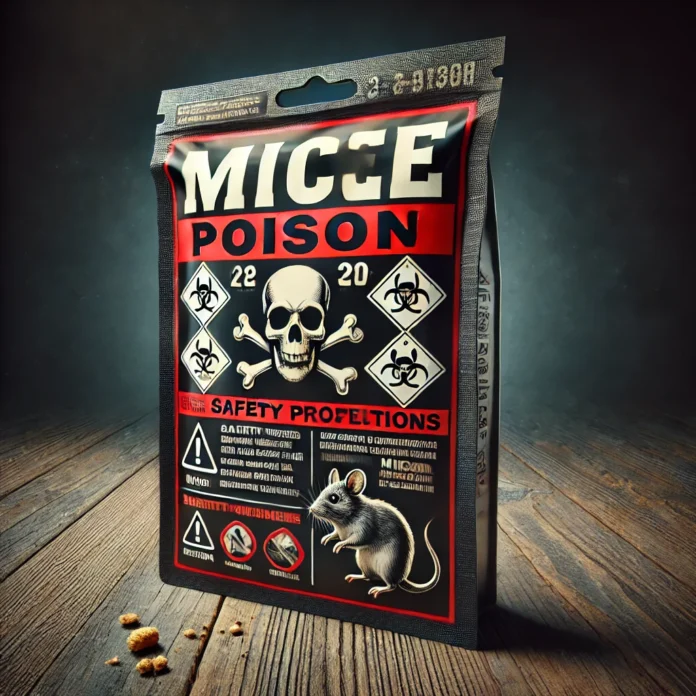As a result of the difficulty of dealing with a mouse infestation, many homeowners resort to using mice poison. But there are a lot of rules about using mouse poison that are put in place to make sure that people, pets, and the environment are all safe.
Anyone thinking about using mouse poison at home or in the office must familiarize themselves with these rules. Make sure you use these products in a responsible and lawful manner by reading this exhaustive guide on mouse poison regulations.
Introduction to Mice Poison
Poisoning rodents is a common practice for managing rodent populations. In its most common form, it is a bait that contains substances that kill mice. Although efficient, mouse poison needs cautious management to avoid inadvertently harming people and non-target animals. There are systems in place to monitor the distribution, use, and sale of mouse poison in order to reduce these hazards.
Importance of Mice Poison Regulations
Regulations surrounding mice poison are essential for several reasons:
- Safety: Prevents accidental ingestion by humans, pets, and wildlife.
- Environmental Protection: Minimizes the impact of poisons on ecosystems.
- Effectiveness: Ensures that mice poison products are reliable and used correctly.
- Legal Compliance: Helps users avoid legal repercussions of improper use or distribution.
Understanding these regulations helps users apply mice poison safely and effectively while adhering to the law.
Key Regulatory Bodies
Several organizations oversee the regulation of mice poison:
Environmental Protection Agency (EPA)
Products containing mouse poison must be registered, labeled, and used in accordance with EPA regulations in the US. Before these products are released into the market, it makes sure they fulfill safety and efficacy requirements.
Food and Drug Administration (FDA)
The FDA may be involved in regulating components of mice poison that have implications for human health, mainly if the poison is used in environments where food is present.
Local and State Authorities
State and local governments may have additional regulations governing the sale and use of mice poison. These can include licensing requirements for sellers and restrictions on where and how poisons can be applied.
Types of Mice Poison and Their Regulations
Mice poison comes in various forms, each subject to specific regulations: Anticoagulants.
The most common type is anticoagulant-based mice poison. It works by preventing blood clotting, which can lead to internal bleeding in mice. These poisons are tightly regulated due to their potency and potential risks to non-target species.
Non-Anticoagulants
Non-anticoagulant mice poison uses different active ingredients to kill mice. Although these may be subject to less stringent regulations, they still require careful handling and usage according to manufacturer guidelines.
Natural and Organic Poisons
Organic and all-natural alternatives to rodent poison are becoming increasingly popular. The effectiveness of these solutions against mice is guaranteed while they are approved to be safe for use around humans and pets.
Legal Requirements for Purchasing and Using Mice Poison
Age Restrictions
Many jurisdictions impose age restrictions on the purchase of mice poison. Typically, buyers must be at least 18 years old; in some cases, a valid ID is required to prove age.
Licensing for Sellers
Retailers who sell mice poison may need to obtain specific licenses or permits. This ensures that they comply with safety standards and are knowledgeable about the products they sell.
Labeling and Packaging
Mice poison must be appropriately labeled with clear instructions, safety warnings, and information about active ingredients. Packaging must be secure to prevent accidental access by children and pets.
Application Regulations
Regulations may dictate where and how mice poison can be applied. For example, some areas may prohibit certain poisons in public spaces or require professional application to minimize risks.
Safety Measures and Best Practices
Adhering to safety measures is crucial when using mice poison:
Proper Storage
Never let children or pets near mouse poison; instead, keep it in a closed, safe place. Put a tight lid on the container to avoid inadvertent swallowing.
Correct Application
When applying mice poison, follow the manufacturer’s instructions carefully. Use the recommended amount and place bait stations that are inaccessible to non-target animals.
Monitoring and Disposal
Monitor bait stations regularly to remove dead mice and replenish bait as needed. Dispose of dead rodents and use poison responsibly to prevent secondary poisoning of other animals.
Personal Protective Equipment (PPE)
When handling mouse poison, it is important to wear protective gear such gloves and a mask to minimize the chance of exposure to harmful compounds.
Penalties for Non-Compliance
Failing to comply with mice poison regulations can result in severe penalties, including:
Fines
Violators of rules and regulations may be subject to hefty penalties. The sum might change based on the seriousness of the crime and the relevant authority.
Legal Action
Legal action may be taken in cases of significant non-compliance, leading to court appearances and potential criminal charges.
Product Recalls
Regulatory bodies may mandate recalls of mice poison products that do not meet safety standards, impacting businesses and consumers.
Environmental Impact and Sustainable Practices
Impact on Wildlife
Improper use of mice poison can harm non-target wildlife, including birds, pets, and beneficial rodents. Regulations aim to minimize these impacts through controlled application and restricted access to poisons.
Sustainable Alternatives
Regulations encourage the development and use of sustainable mice poison alternatives. These include environmentally friendly products that reduce ecosystem harm while effectively controlling rodent populations.
Integrated Pest Management (IPM)
IPM strategies combine mice poison with other pest control methods such as trapping, habitat modification, and biological controls. Regulations often support IPM approaches to promote environmentally responsible pest management.
Future Trends in Mice Poison Regulations
Stricter Safety Standards
As awareness of mice poison’s environmental and health impacts grows, regulations are likely to become more stringent. This includes tighter controls on active ingredients and more rigorous testing requirements.
Increased Focus on Non-Toxic Alternatives
There is a growing trend towards non-toxic and organic mice poison solutions. Future regulations may favor these alternatives, promoting safer and more sustainable pest control methods.
Enhanced Monitoring and Reporting
Advancements in technology may lead to improved monitoring and reporting systems for mice poison usage. This can help regulatory bodies track application practices and ensure compliance with safety standards.
Conclusion
Understanding and adhering to mice poison regulations is essential for effective and safe pest control. By staying informed about the latest rules and best practices, you can ensure that your use of mice poison is both legal and environmentally responsible. Whether you are a homeowner, business operator, or pest control professional, prioritizing compliance with mice poison regulations protects your immediate environment and the broader ecosystem.
Embrace responsible pest management by following regulatory guidelines, choosing safe and effective products, and implementing sustainable practices. This approach resolves rodent issues efficiently and safeguards the health and well-being of all living creatures in your vicinity.
Short FAQs
Are all types of mice poison-regulated?
Yes, all types of mice poisons, including anticoagulant and non-anticoagulant poisons, are subject to regulations to ensure their safety and effectiveness.
Can I use mice poison without a license?
In many jurisdictions, homeowners do not need a license to use mice poison. However, commercial use may require specific permits or licenses.
What should I do if a pet ingests mice poison?
If a pet ingests mice’s poison, seek immediate veterinary assistance. Acting quickly is crucial to preventing serious health issues.
Are there eco-friendly mice poison options?
Yes, there are alternatives to mouse poison that are safer for the environment and less harmful to animals that aren’t intended targets.
How can I safely dispose of used mice poison?
Dispose of used mice poison according to local regulations. Typically, this involves sealing the poison in a secure container and taking it to a designated disposal site.


